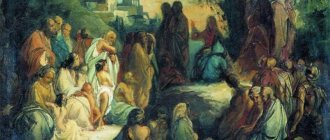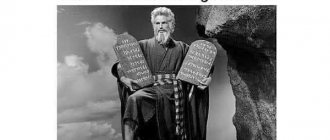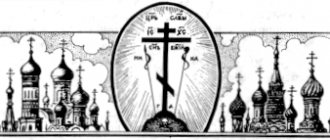When a person opens his heart to the Lord and chooses the path of Christianity, the laws of God become a necessity for him. It is impossible to live a righteous life without understanding its principles, canons and values.
The Ten Commandments of the Lord are a “guiding star” that illuminates the path of the righteous, prompts and guides. This is a real moral guideline in all earthly situations, which gives strength to evade evil and create good, strengthens faith and enriches spiritually.
Interpretation of the 10 Commandments of God
I. I am the Lord your God, and there are no other gods besides Me.
A sincere believer will not allow polytheism. God is one for everyone, he is the truth, having comprehended and accepted it, it is important to follow the intended path, without stumbling or turning aside. The fact of worshiping another God can mean that a person is in the grip of doubt, tossing, uncertainty and unsteadiness of spirit, bordering on deceit and duplicity. It is impossible to look for the source of faith, goodness, wisdom and patronage in several instances at once.
Between the lines it is read that only the Lord and unity with him can be the main guideline on the earthly path, and, in no case, neither power, nor money, nor the untold riches of the material world.
II. Do not make for yourself an idol or any image; do not bow down to them or serve them.
The Lord condemns blind worship of idols or deities other than himself. He does not accept being like the pagans in their veneration of heavenly (sun, stars, moon) or earthly (people, animals, plants) idols.
In the modern world, the creation of an idol is closely associated with thoughtless copying of one’s “ideal”, lust for material values, or dependence on any habit. The idols are:
- public people (actors, politicians, show business celebrities);
- Internet, television, gadgets;
- apartments, cars, jewelry;
- money;
- science, art, creativity;
- fanatical adherence to diets;
- family and friends;
- own "ego".
The first phrase of the commandment has long become “winged” and carries a warning not to create an ideal image in your thoughts and not to strive to be its copy. Neglect of one's own individuality is not approved by God, since idolatry destroys faith and leads to spiritual emptiness.
III. Do not take the name of the Lord your God in vain.
There is also a paraphrased form of the commandment: “Thou shalt not take the name of the Lord in vain.” Moreover, the words “in vain” and “in vain” carry the same meaning: in vain, aimlessly, senselessly, uselessly, excessively, unnecessarily.
Unfortunately, the laity often pronounce the name of God in sinful vanity:
- Making empty promises.
- Presenting your idea as a postulate of the Almighty.
- With idle exclamations of frustration, in hearts, and fear: “Lord!”, “Oh, my God!”
- Blasphemy against the Lord is blasphemy.
- During oaths, to add weight and persuasiveness to your words: “I swear to God!”
According to the New Testament, oaths should be avoided altogether. A person who is not the creator of all living things and the world as a whole has no reason to swear by anything. The need to follow the commandment lies on the surface. Saying the Lord's name aimlessly can be considered a sign of disrespect and devaluation.
IV. Work for six days and do all your work, and devote the seventh day to the Lord your God.
For God-obedient Christians, the seventh day of the week is a holy day, blessed and sanctified by the Lord. On Sunday, believers go to church to read prayers of gratitude to the Creator for all the blessings of life and events of the past week and ask to bless them for the coming seven days.
It is recommended to refrain from usual work, but the Lord rewards with all generosity for helping family and friends, caring for the sick and infirm.
V. Honor your father and mother, that you may be blessed on earth and live long.
According to the laws of the Old Testament, any offense, by word or action, condemnation, reproach, insult or grumbling against one’s parents is considered one of the gravest sins.
What actions violate the commandment?
- indifference towards parents, coldness, irritation or anger;
- lack of gratitude for the life given;
- stubbornness, disobedience, rudeness in dealing with elders;
- refusal to pray for parents;
- anger at the advice and instructions of father and mother;
- shyness due to ignorance or illiteracy of parents;
- ridicule or disparagement of older people's experiences, views and values;
- intolerance to the habits and infirmities of older relatives;
- physical and moral aggression, murder (literal or verbal);
- being left without help in illness, despondency, grief;
- refusal to fulfill a sacred duty - the burial ritual and execution of the will expressed in the will.
The commandment calls for unconditional love, honor and respect for parents or those who have assumed their role. Take care, share labors, pray to the Lord, patiently endure whims and infirmities, be support and consolation until death, and also follow advice that does not contradict the canons of God.
VI. Don't kill.
By taking the life of a neighbor or himself, a person commits a terrible, grave sin. Giving life to the living is the great mercy of the Lord, and taking it away is a cruel crime against the providence of the Creator.
To keep the commandment, it is important not only to have control over your actions, but also to keep your thoughts in check.
Crimes against the sixth commandment:
- intentional murder, organization or complicity in a crime;
- accidental killing (during military exercises, during an accident);
- attempted murder in a state of passion, intoxication or mental illness;
- injuring oneself or someone else;
- infecting other people with sexually transmitted diseases;
- thoughts, attempts or commission of suicide;
- abortion;
- leaving a sick or wounded person without help;
- providing a murder weapon (poison, medicine, weapons);
- participation in a beating, observation of a fight or massacre;
- passion for watching bloody TV shows and shows;
- putting one's life or others at risk for the sake of profit;
- undisguised hatred, cruelty,
- neglect of treatment, delay;
- addictions (wine drinking, drug addiction);
- wearing unhealthy clothes, eating unhealthy food.
Murder is contrary to human nature, and the thought of such a thing causes trembling in the soul of a true Christian. According to all laws - civil, church and divine, it is considered a serious crime and cannot be justified by anything.
VII. Don't commit adultery.
The Lord condemns the violation of mutual fidelity for the sake of sinful fornication. A person not bound by marriage should also maintain spiritual purity, eradicate bad thoughts and intentions, and not succumb to temptations and passions from the evil one.
Neglect of the commandment does not only involve adultery. There are many reasons to succumb to the devil’s vices:
- promiscuity;
- adultery – betrayal of one’s legal spouse;
- cohabitation without marriage or wedding;
- out-of-wedlock pregnancy;
- lewd acts, visiting brothels;
- sodomy (homosexuality), lesbianism, transsexualism (gender reassignment);
- child molestation;
- bestiality - intercourse with animals is considered the highest degree of sin in violation of this commandment;
- sexual perversions, handjob, group sex;
- accepting or participating in the fornication of others.
In his commandment, the Lord calls on Christians not to succumb to temptation and to maintain chastity in their actions, desires and thoughts.
VIII. Don't steal.
The Lord expresses a prohibition on the appropriation of any type of property of a neighbor. Robbery, theft, complicity in theft, and harboring criminals are considered grave sins.
Damage to other people's property and speculation in goods and services are also condemned, especially during critical situations and natural disasters. The Lord also prohibits theft of state property, greed, bribery, extortion and all types of fraud.
The Almighty calls to get rid of the desire to own anything, and if you achieve anything, then with your own labor, with pure and deeply moral intentions.
IX. Do not bear false witness against your neighbor.
Slander and false testimony are considered low vices that defile relationships with family, friends and everyone around. Even the laws prescribed by judicial law do not justify violating the commandment by sentencing the innocent or hiding evidence for a certain “bribe.”
The commandment condemns ridicule, evil practical jokes, obscene jokes, idle talk, talkativeness, gossip, false denunciations, the habit of eavesdropping, spying, lying and judging.
Adventists often talk about “the law within the Law,” about two laws. What is the misconception?
The first is the Law of Moses (ceremonial law), which regulated various ritual regulations: marriage relations, legal regulations, sanitary and hygienic instructions, sacrifices of cleansing for sins, kosher products, circumcision, etc. - this law was subsequently destroyed on the cross by Christ. The Second Law is God's Law, the Decalogue, consisting of the Ten Commandments. Ritual prescriptions were so firmly embedded in the fourth commandment of the Law that they created the precondition for non-fulfillment of it to the extent that God required of the Jews. But Christ Himself becomes for New Testament Christians the Living Sabbath - rest, Sabbath, and therefore He says: “Come to Me, all you who labor and... I will give you rest (Sabbath, “I will give Saturday” - literally) you... and you will find rest (Sabbath, i.e. Christ, for He is our rest) for your souls” (Matthew 11:28). And so it turns out that the same Adventist sectarians who accuse the Orthodox of not fulfilling the fourth commandment exchanged the Lord of the Sabbath for the Sabbath itself, the veneration of which in the Old Testament was expressed through ritual decrees. Rituals (“unbearable burdens”) were inextricably linked with the Sabbath and had no basis in moral decrees. Christ Himself noted this with miracles performed on Saturday (healing a man with a withered arm, a man born blind, or a sick person in the pool at the Sheep Gate).
Accordingly, in Ex. 12:16 the first day was actually set aside as a holy day of rest BEFORE the Jewish Sabbath, and these instructions were given to Moses and Israel BEFORE any law was revealed at Mount Sinai.
New Testament Christians do not gather on the Jewish Sabbath. They meet on the FIRST day of the week (Acts 20), and make their assemblies on the FIRST day of the week (1 Cor. 16:1-4), and preach on the FIRST day of the week (Acts 20:7), because their Savior was resurrected in FIRST day of the week (Luke 24; Matt. 28), and the Holy Spirit descended on the FIRST day of the week (Acts 2:1-6).
The confusion of law and grace is called GALATIANISM.
New wine is poured into new wineskins, but not into old ones, so that the skins do not burst and the wine leaks out (Matthew 9:17).
By mixing law and grace, we destroy both. We rob the law of its fear and condemnation, and we rob grace of freedom, joy and life.
What is the purpose of the law?
As Christians, we are not governed by the law. Scripture says, “The law is not made for the righteous, but for the lawless and disobedient, the ungodly and sinners” (1 Tim. 1:9). The law is like a mirror. A mirror may show that your face is dirty, but it will not help wash that dirt off your face. The same applies to the law. THE LAW SHOWS THAT WE ARE SINNERS AND SPIRITUALLY DEAD, BUT DOES NOT GIVE US ANY SOLUTION TO THE PROBLEM.
We not only see our helplessness, but also begin to understand that we are like a man without arms. We see our reflection, our need for cleansing, but we cannot do anything. If we want to clean our face, that means someone has to do the job. This is why the book of Galatians (Gal. 3:24) says that the purpose of the law is to bring us to Christ.
Why does the law lead us to Christ?
Because he himself is powerless to save us. “However, knowing that a man is not justified by the works of the law, but only by faith in Jesus Christ, we also believed in Jesus Christ, that we might be justified by faith, and not by the works of the law; for by the works of the law no flesh will be justified” (Gal. 2:16 ).
The law requires perfection. Since we are all born sinners, it is impossible for any of us to live up to the perfection required by the law. Our only hope is to turn to Christ. If the law has done its job (brought us to Christ), resulting in us gaining faith, then this means that the purpose of the law has been fully achieved.
When we accept Jesus by faith, we accept the fact that He paid the full price for sin, and we accept His life, and then our identity is no longer that of a filthy, ungodly sinner, but of a new creation.
The path of the law is the path of the flesh, of self-help. He is only a guide to Christ.
Further we can contrast, according to the apostle: Isaac - Ishmael; Heavenly Jerusalem to earthly; barren (little flock, Luke 12) - fruitful (peace); to the son of a free woman - the son of a maid; to the son of promise - the son of the flesh (own works); New Testament - Old Testament and so on. You see: the son of a servant (Ishmael) was born through carnal calculations against the will of God. Isaac was born supernaturally on the basis of God's promise (Rom. 4:18-25). Here is the difference between the Old and New Testaments. The earthly Jerusalem with the law, sacrifices and temple led the Jews, as representatives of the Old Testament, to reject Jesus (1 Cor. 2:8). Heavenly Jerusalem (Heb. 9:11-17) is the mother of all the New Testament children of God, which is why the city is so wondrous and desirable, the inhabitants of which they can become (Rev. 21:9-27). The children of God are free and are not under the law of Sinai, but under the law of the spirit of life (Rom. 8:2). For just as the flesh desires what is contrary to the spirit (Gal. 5:17), and the carnal mind is enmity against God (Rom. 8:7), so today he who is born according to the flesh persecutes him who is born according to the Spirit (the eternal war of the Arab world with the Jews). There can be no relationship here, although Ishmael and Isaac come from the same father, but they had different mothers. The son of a servant (unfree) was to be expelled.
History of origin
The 10 commandments were given to Moses by Jesus Christ himself. How did this happen? This historical moment is described in the Bible. If we talk about it very briefly, it was in Zion. Zion was in fire and smoke, thunder roared, lightning flashed. And in this element, suddenly the voice of God was clearly heard, pronouncing the commandments. And then God wrote the commandments He gave on two tablets and gave them to Moses. Moses stayed on the mountain for 40 days, and when he went down to the people, he saw that they had forgotten about God. People danced and had fun, jumping around the golden calf. Moses became furious at this sight. He broke the tablets with the commandments. And only after the people repented, God ordered Moses to make new tablets and bring them to Him to re-write the commandments.
All 10 commandments will be given below. For easier understanding, they are presented in simple and concise language. Except for the first one, perhaps.
So, why does it make no sense to talk about the Sabbath as a moral commandment?
Therefore, dividing the Law in the 4th commandment into a ritual form of service and talking about the Sabbath as a moral commandment makes no sense, because the Old Testament affirmation of the Sabbath is built on the formal ritual elements of its retention. Moreover, the Apostle Paul in Rom. 3:19-20 says, “For by the works of the law no flesh will be justified in His sight; for by the law is the knowledge of sin.” At one time, Israel, which was supposed to be a partaker of the promise, willingly remained under the bondage of the law even when Christ came - “the end of the law for the righteousness of everyone who believes” (Rom. 10:4).
Thus, because of the law, with the help of which the Jews thought to please the Lord, they became the enemies of Christ (John 5). This opposition between Law and grace runs like a red thread throughout the entire New Testament. Here the flesh and the spirit are opposed, slavery and sonship, Ishmael - Isaac, Hagar (Sinai) - Sarah (Jerusalem), the vanity of one's own efforts - a gift from God, and so on (see Epistle to the Galatians). If an Adventist claims to keep the Sabbath in the spirit, then this once again confirms his poor knowledge of the spirit of Scripture (of course, knowing its letter well). It is impossible to keep the law in the spirit, since the spirit points us to Christ and explains Him to us, leading us away from the law (John 16). Whoever stands on the basis of legality, stands on the basis of the curse of the law. In this case, the Adventist will immediately open Rome to you. 7:1 and reads: “...the law has power over a man as long as he lives.” Ask him a question: have we not died with Christ? And we are baptized into His death - therefore we must die to sin with Christ. Here in the Epistle to the Galatians (Gal. 2:19-20) it says: “By the law I died to the law, that I might live to God. I have been crucified with Christ. And it is no longer I who live, but Christ who lives in me. And what I now live in the flesh, I live by faith in the Son of God, who loved me and gave Himself for me.” Why do you again, knowing Christ, become a “legalist”? What else do you want to earn from the Lord by these works?
The most important points in the controversy with Adventists
But here’s what’s important to highlight in polemics with Adventists. This is as important as, say, proving to Jehovah's Witnesses that Jesus and Jehovah have the same Divine nature. So, here it is necessary to point out that the Law and the law are so closely interrelated that the 4th commandment without the ritual side of its component, without the literal fulfillment of all its elements, is violated. If you live according to the Law (moral), as prescribed for Israel (Ex. 31: 12-17), then you need to fulfill the entire Law, and not its individual elements (cf. James 2:10 and Lev. 26: 14; 39). But since the 4th commandment is associated with its obligatory ritual side, this interpenetration of law into the Law creates the precondition for the impossibility of fulfilling everything required and, accordingly, a curse.
Thus, the SDA, trying to observe individual elements of the 4th commandment, cutting off, as it seems to them, everything ritual (but through ritual the 4th commandment is affirmed!) and burdensome in it, they are already putting themselves under the sentence of death. For it is written: “Cursed is everyone who does not do all that is written in the book of the law” (Gal. 3:10).
Features of preparation
It is difficult to independently prepare for the full rite of repentance, without the help of a spiritual father or at least appropriate literature. There are a number of books compiled to help penitents. They include explanations of what a commandment and sin are, what the danger of sin is and what further responsibility is, as well as sermons of the holy fathers on repentance. Some publications include a detailed analysis of the commandments or sins tortured in ordeals, with their listing.
It is useful to read the instructions of the elders, which nourish the soul and incite them to repentance. It is important to pray, sincerely repent, and lament what you have done. Orthodox prayer books contain canons of repentance to the Lord and the Most Holy Theotokos, as well as prayers that are read before and after confession.
When repenting, it is important not to allow despondency, but to fully hope in God’s mercy, glorify the Lord, give thanks for everyone’s blessings, for the time available for repentance and correction of one’s life.
Daily Prayer
Reading the instructions of the elders
Conversation with a clergyman








